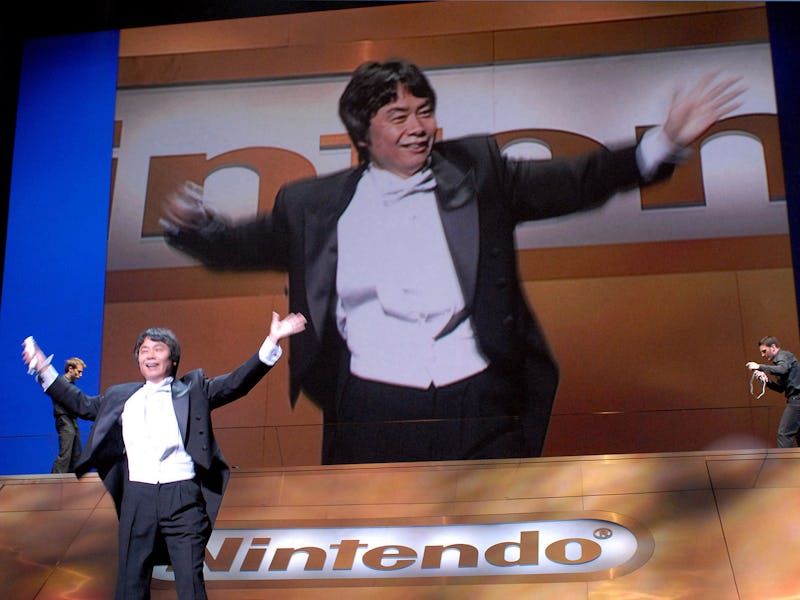Remembering Wii Music, Nintendo’s Most Prescient Flop
The bizarre, ambitious game was no match for 2008’s video game landscape.

Before there was Wii, there was Wii Music.
The first time a global audience saw Nintendo’s motion-control juggernaut in action, it wasn’t a demo of Super Mario Galaxy or The Legend of Zelda: Twilight Princess or even Wii Sports. When Shigeru Miyamoto came out on the Kodak Theatre stage for E3 2006 to introduce the world to Nintendo’s big new idea, he waved the brand-new Wii Remote like a conductor’s baton while an orchestra of Miis played behind him. We didn’t know it then, but the mini-game would end up as a mode in Wii Music over two years later on October 20, 2008.
“I wasn’t this excited when we created Super Mario Bros,” Miyamoto said in an Iwata Asks interview about the game. “This game may be exactly what I’ve wanted to accomplish all this time.”
So how did a game that demonstrated the power and intuitive fun of a console that would sell over 100 million units — and one the father of Mario, Zelda, Donkey Kong, and Pikmin has said is the culmination of his long and hallowed career — become synonymous with embarrassment and failure? How did Nintendo get it so wrong?
Or, put another way, what did we all get so wrong about Wii Music?
Wii Music only sold 3 million copies, compared to Mario Kart Wii 37 million.
I was one of the more than 3 million or so who bought a copy. I loved it from the get-go. Many of you… did not. At the time, Guitar Hero and its ilk were what music game fans expected. Wii Music instead tasked you with creating your own versions of songs using a variety of motion inputs. You could mix and match instruments and then watch a music video of your band’s performance. Wii Music was something between a game and an instrument. It provided tools and expected its players to create something worth sharing. Most instead purposefully waved their hands like someone who just touched a hot stove, creating headache-inducing dreck.
The game soon became a stand-in for a joke, the kind of thing people namecheck when they wish to express shame or ironic excitement. Most Loved Game? Wii Music, haha. Most Anticipated Game? Wii Music 2, ha. (Nintendo had plans for such a project, with a patent showing what appeared to be a Wii U GamePad.)
But unbeknownst to us, seeds were being planted. Look around at the gaming culture in 2023. The most popular game (Roblox) is less about good looks and more about experimenting with player creations. Last summer, Trombone Champ became a viral hit, somehow turning bad-sounding songs into streamable hilarity. Even Nintendo came back to a tool-based suite masquerading as a game with its Super Mario Maker duology. Fifteen years after Wii Music’s failure to launch, things look familiar to fans of Miyamoto’s pet project. (Credit where it’s due: Kazumi Totaka, long-term sound designer and real-life K.K. Slider, was Game Director.)
In 2008, Wii Music was no match for Guitar Hero.
Playing today, the game still feels different than other attempts to meld music with interactivity. With a simple bop or cascade of the Wii Remote, you plunk out notes that ring with reverb, are dampened with a muted strut, or glide along an arpeggio. Each song has an invisible note chart — when you move your hands, an appropriate note sounds. Critics felt there wasn’t enough agency. This was a game that played itself. But you get to choose everything else: the duration, the timbre, the sequence. When used sincerely, there is a strong illusion of building something out of thin air.
In the music game de rigueur at the time, Guitar Hero, you chose nothing: You simply tried to keep up with the notes already laid down for you. Seen from the perspective of a traditional score-chasing player, there was a challenge to overcome. But people interested in creating something were left with nothing to do. As Billy Corgan told Rolling Stone in 2008: “You don’t play Guitar Hero if you are a Guitar Hero.”
Critics felt there wasn’t enough agency. This was a game that played itself.
For many, games are about mastery. But with music, and Wii Music, everything is subjective. There’s no score other than the one you give yourself after completing a song. The end result is not for an achievement or to progress through a level or to gather followers: The music is its own reward. Many do not feel comfortable with such low incentives. First-party Nintendo games hold their value incredibly well. Mario Kart Wii, which sold over 37 million copies, still commands $30 used at GameStop. Wii Music, with a little over 3 million sold, isn’t even listed and can be found on various sites for around $5. The supply is low, but the demand is even lower.
Had Wii Music come out today, its earnest tone and flexible creation suite may have hit a chord with streamers. Vulnerability is in. But in 2008, a suitable platform did not yet exist. At the time, the only way to share your creations was with other Wii consoles using WiiConnect24, the online service that was terminated in 2013.
Might we one day see a return of Nintendo’s under-appreciated music game? The company is fond of squeezing the potential out of limited hardware, and music itself is about harnessing limitation. (Western music typically uses one of twelve notes. Twelve!) Yet the possibilities are endless. Happy 15th birthday, Wii Music. May your wish one day come true.